Edie Melson's Blog, page 157
July 17, 2021
I Took My Character to Coffee

by Tammy Karasek @TickledPinkTam
No really, I did. I got the idea from when my daughter was in Junior High. Some days she’d return from school and I could tell something was on her mind. Of course when I’d asked, the answer was nothing or I dunno.
Frustrated and I’d wonder how to get it out of her, I tried all sorts of things. One day, I had an idea and waited to try it. I knew she loved to get a taco over at The Bell, so on a day she came in sad, I asked if she’d like to go for supper there. And she did.
Once there, she slowly offered a comment or two about the day. I’d let her talk but kept my responses to shakes or nods of my head. Within no time, she would unload all that was on her mind. It worked like a dream.
Recently, I was stuck with my character. I felt stuck with where I was going with her. She started to resemble that elementary school character the kids mail to other kids—flat Stanley. She had become flat and boring to me. And if to me, pretty sure it would be to my readers.
I moved around the house with my laptop, hoping by changing my location something would pop into my head of what she might be thinking. Yet nothing.
Then the light bulb went on and I decided to take her for coffee. She didn’t seem like a taco girl and even though I don’t drink coffee, I thought she might. Off we went. I drove, she rode along tucked inside of my laptop.
I arrived, ordered the drinks and placed my laptop on the table. I opened up a blank document and instead of talking out loud, I started having a conversation with my character via the keyboard. (Strange looks were given—er—I mean, I think they might have been given had I done that, cough-cough) I have to admit, it was weird at first, but once I got going, I gained perspective on where I was trying to take my character and it wasn’t working. Like the whole square peg, round hole type of issue. But I couldn’t see it while I was writing it.
I actually had fun having this conversation. Don’t get me wrong, I realize I wasn’t talking to a real person, but I started asking questions AS IF I was. The questions began to point me to the fact that I had created parts of this character without thinking them all the way through. So she would ask questions like: why do you make me huff a lot, why’d you give me a temper and I explode so fast—you make me look mean but I’m not? Do I always have to show up late? Am I rude?
When I looked at the good qualities I’d given her, I’d said patience and compassion. But in a few scenes, well she was neither of those. She was more like a hot-tempered firecracker. It was quite revealing and showed me exactly why I didn’t like her anymore. She wasn’t the original character I plotted out. Yikes.
This exercise might be a little off the wall, but it was actually fun for me. I asked questions to make myself re-think some of the traits I’d given her. Looking back at my notes from when I began the story idea, there were a few misfires in how the character would play out.
While this might not be something you’d care to do, as it might look odd sitting at a coffee shop with two cups of coffee across from each other, I do recommend you try it sometime. Ask your character what’s on his or her mind. What would they like to change or improve? It may give your work-in-progress a bit more depth.
Fess up, have you done something similar with your character before? Do tell in the comments below.
TWEETABLEI Took My Character to Coffee - @TickledPinkTam on @EdieMelson (Click to Tweet)
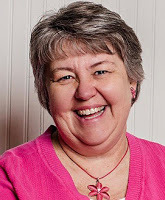 You’ll find Tammy using humor and wit to bring joy and hope to every aspect in life. She’s gone from down and defeated from a past filled with bullying and criticism from family to living a Tickled Pink life as she believes there is always a giggle wanting to come out! All because of HIM.
You’ll find Tammy using humor and wit to bring joy and hope to every aspect in life. She’s gone from down and defeated from a past filled with bullying and criticism from family to living a Tickled Pink life as she believes there is always a giggle wanting to come out! All because of HIM.She’s the Social Media Coordinator for the Blue Ridge Mountains Christian Writers Conference. President of ACFW Upstate SC, Past-President and current member of Word Weavers Upstate SC and Past-President of Cross N Pens Writers Group. She’s a member of My Book Therapy/Novel Academy. A writing team member for The Write Conversation, contributor for the Learn How to Write a Novel Blog and others. Published in the Divine Moments Compilation Book—Cool-inary Moments.
She’s married to her college sweetheart Larry, a mom to their grown daughter, Kristen and excited to add a son-in-law in 2021. Born and raised in Ohio, she now lives in South Carolina. Connect with Tammy at HTTPS://TAMMYKARASEK.COM.
July 16, 2021
Writer’s Block—When the Words Won’t Come

by Emme Gannon @GannonEmme
Nothing was working. I’d paced, took a long walk, sat in the garden and daydreamed, even succumbed to a soothing cup of tea. Words still eluded me. Fear leaped into my heart and I wondered if this was it. Had my writing finally dried up and my years of weaving words into stories come to an end? A drab end, to be sure. Never accomplishing all I had dreamed of, hoped for, or imagined.
Was God moving me away from creating words to something else? Like Peter, who was once a fisherman, or Paul a tentmaker. Or, was I like Jonah, who God had called but who at first ran from God’s call. No matter how large or small the mission, when Jesus calls, we follow or run. What was this struggle going on in my soul?
Why these feelings?
Asking why unlocks a plethora of emotions, all signposts which can lead to the reason we run from who we are. The coping mechanisms and self-talk begin to dissolve with the light of exposure.
As is true with all we do, we lock up when our internal self casts doubt. Doubt is like a storm that transforms us from a productive person to one beset by internal roadblocks. Our image cracks. Then we run and hide. We cease to believe in ourselves. We think we’ve failed. Then we do the worst possible thing—we compare our writing to others. By doing so we remove our strength, our individuality, our very writing voice.
Overcoming writer’s block is not a simple process.
Often the block is birthed in our contrived image of ourselves and what we seek to accomplish. I stared at a blank screen for too long before my fingers started tapping the keys—words that only came when I remembered that it is God that ordains my image, my calling, my stories. Reconnecting with our unique way of writing frees us to write again.
By allowing the Lord to give His wisdom, strength, and direction, we will begin to break free from the bondage of an emotional block of any kind, thus being free to write what brings us joy, not just what the market is demanding at the time. Our words will then have passion as we dig deep from a heart yielded to God.
There are days when life shuts us down and all we can do is look to heaven, raise our arms like a child, and cry, “Help!” We wait in silence for an answer, not knowing that all the time Jesus has been by our side, attending to us with deep love, and waiting for our surrender. We may never write a famous novel to achieve star status, but our words will be ours, woven by the Master’s design.
TWEETABLEWriter’s Block—When the Words Won’t Come - @GannonEmme on @EdieMelson (Click to Tweet)
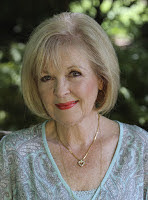 Emme Gannon is a wife, mother, and grandmother who loves to write stories that stir the heart. Her award-winning writing has appeared in Focus on the Family magazine, several anthologies, and numerous newsletters. She just completed her first novel.
Emme Gannon is a wife, mother, and grandmother who loves to write stories that stir the heart. Her award-winning writing has appeared in Focus on the Family magazine, several anthologies, and numerous newsletters. She just completed her first novel.
July 15, 2021
How to Have More than Three People at Your Book Signings

By Crystal Bowman
Now that we are emerging from pandemic isolation, it won’t be long before author book signings return to encourage face-to-face marketing. Book signings sound like fun, right? People actually get to meet a real-live author and purchase an autographed copy of their book—maybe even with a personal message written on the inside cover. So exciting! But here’s the reality—book signings can be the most humbling experience of an author’s life.
At my first book signing, I was excited to have stacks of books just waiting to be autographed and sold. However, I sold and signed three books. One to my mother, one to my sister, and one to a customer. Over the years I have had better success with book signings and have found a few ways to improve the experience.
Go where the people are. The truth is that unless you are world famous, very few people go to author book signings. So since the people don’t come to me, I go to them. I try to schedule my signings when there are other events happening in the store. One of my best signings was when the bookstore was having a carnival for kids in the parking lot. The kids needed to come into the store to redeem their tickets for prizes and walked by my table with their parents who stopped to look at my books. None of these families came to the store because I was there. I sold lots of books because the kids and parents were already there.
Don’t limit your signings to bookstores. Another successful signing I had was at a mega supermarket. They set me up in the kids’ section of the store where there was plenty of foot traffic. I also had my daughter with me (who was six at the time). Her blonde pigtails and sweet smile caught the attention of many shoppers who couldn’t resist buying a book from us. Some of them even ask her to sign it!
I have also had good signings at toy stores during the peak of holiday season. Having books at a store other than a bookstore makes your book stand out rather than blend in with thousands of other books.
Get a table or booth at specific festivals. Years ago I wrote a children’s picture book about the Holland Michigan Tupil Time Festival. For a small vendor’s fee, I had a table at their marketplace where other souvenirs and novelty items were sold. My picture book was the perfect gift for Grandma and Grandpa to bring back home to the grandkids.
Invite another author to join you. Glenys Nellist is one of my author friends who also lives in Michigan and writes books for children. If one of us gets invited to do a book signing, we often invite the other to join. It always brings more people to the store, and most of them buy books from both of us so it’s a win-win for all.
These ideas only scratch the surface when it comes to possibilities. With some creative ideas and thinking outside the box, your book signings can be a pleasant experience. You may end up having more than three people in addition to you mom and sister.
Please share more ideas for books signings. What has worked for you?
TWEETABLE How to Have More than Three People at Your Book Signings - Crystal Bowman on @EdieMelson (Click to Tweet)
 Crystal Bowman is an award-winning, bestselling author of more than 100 books for children and four nonfiction books for women. She also writes lyrics for children’s piano music and is a monthly contributor to Clubhouse Jr. Magazine. She loves going to schools to teach kids about poetry. She also speaks at MOPS (Mothers of Preschoolers) groups and teaches workshops at writers’ conferences. When she is not writing or speaking, she enjoys going for walks, working out at the gym, and eating ice cream. She and her husband live in Michigan and have seven huggable grandkids.
Crystal Bowman is an award-winning, bestselling author of more than 100 books for children and four nonfiction books for women. She also writes lyrics for children’s piano music and is a monthly contributor to Clubhouse Jr. Magazine. She loves going to schools to teach kids about poetry. She also speaks at MOPS (Mothers of Preschoolers) groups and teaches workshops at writers’ conferences. When she is not writing or speaking, she enjoys going for walks, working out at the gym, and eating ice cream. She and her husband live in Michigan and have seven huggable grandkids. WWW.CRYSTALBOWMAN.COMWWW.FACEBOOK.COM/CRYSTAL.BOWMANWWW.FACEBOOK.COM/CRYSTALJBOWMANWWW.INSTAGRAM.COM/CRYSTALBOWMANAUTHOR
July 14, 2021
Improve Book Sales by Enhancing Public Relations Through Media, Retailers, & Consumers

Susan U. Neal RN, MBA, MHS @SusanNealYoga
Authors want to get higher book sales. To gain that traction, we can market our books through media, retailers, and consumers. Media coverage spreads the word about a book. When retailers carry a book, it becomes available for readers to purchase. When more readers know a book exists, book sales rise. Taking a comprehensive marketing approach to media, retailers, and consumers will stretch your book’s visibility.
Media Authors should write a one-page press release announcing their book to the world. Grab the attention of the reader with the headline and if you can, relate your book to current events. Include statistics, facts, and quotes in your press release. Send the press release to local and regional media. It is vital for authors to develop relationships with local media reporters. Send newsworthy information to the media staff throughout the year in addition to your own book releases. Press releases can also be posted for free on these websites: PRLog.orgNewWireToday.comPR.comOnlinePrNews.comPress release distribution services send your press release to media outlets. Several Christian services exist including:Christian Indie Publishing Association (CIPA--$50 for members, $65 for nonmembers)ChristianNewsWire.com ($75)ReligionNews.com ($295) Recently, four CIPA members received television interviews from CIPA’s Christian media eBlast. What comprises a successful press release? Getting two to four media interviews is considered an effective press release,
Guest BloggingGuest blogging is another marketing tactic as a new audience finds out about you and your book that is listed in the blog’s bio. However, you don’t want to write a guest blog post for websites that do not receive adequate traffic or have a low domain authority. Domain authority is a search engine ranking score that measures the probability that a website will be listed in a search engine result page. You can measure a website’s domain authority at https://moz.com/domain-analysis#indexhttps://moz.com/domain-analysis#index. A domain authority between 40 and 50 is considered average and between 50 to 60 is good. I would not write a guest blog for a site with a domain authority below 15, as that can lower your website’s rank on Google. But writing for a site with a domain authority above yours will improve your website’s rank on Google.
The Christian Indie Publishing Association’s blogging site’s (https://christianpublishers.net/blog/) domain authority is 53. If you would like to write a guest blog for this site, request the blog guidelines at CIPA@ChristianPublishers.net. If you would like to write a healthy living blog for https://susanuneal.com/healthy-living-blog which has a domain authority of 50, request the blog guidelines at SusanNeal@Bellsouth.net. Check out the gorgeous Pinterest Pins created for blogs on both websites. Anyone who clicks on one of the pins, goes to the corresponding blog and finds out about the author and their book. Did you know Pinterest is the second largest search engine on the net? Are you marketing on this social media platform? If not, check out the monthly Pinterest management services at https://thebeautyoftraveling.com/services/ or take the Grow Your Pinterest course.
MagazinesOnline and print, as well as local, regional, and national magazines exist. How can you find and write for these publications? The Christian Writers Market Guide lists magazine venues to query as well as what type of articles the magazine desires. You need to study the magazine to effectively pitch a topic of interest. When I attend writer conferences, I meet with the magazine editors and pitch an article or two. This approach has always landed me an article. Industry relationships are vital to expanding reach.
Podcast, Radio, TV, or Internet Shows
Booking a media tour is a highly effective book marketing tactic. But how does an author find shows? You can pay for a podcast subscription with RadioGuestList.com, PodcastGuests.com, Podmatch.com or purchase a podcaster directory. A list of 125 podcasters sells for $47 at https://cipa.podia.com/list-of-over-100-radio-and-podcast-media. These shows are sorted by Christian genre. This list is free for CIPA members.
Similar to blogger website’s domain authority, you want to determine the audience size of the show by the number of iTunes reviews the show has. Query shows with over twenty-five reviews. Listen to the show to make sure you want to be interviewed. Pitch three topics that meet the needs of the show’s audience.
For television, identify Public Broadcasting Service (PBS) and talk shows in your region or state. Study the shows mission and focus. Query the television (TV) producer and address them by name. Pitch with humor, a current event, or something that will stand out. Pamela Christian provides author coaching to assist you in landing a TV interview.
Track Media QueriesLast year, I queried over 100 shows to get thirty interviews on podcast and radio shows. Tracking my queries on a spreadsheet kept me organized. On a spreadsheet list the blogger, magazine, or podcast name, host name, and email address. Also include what topics you proposed, the date you sent the query, their response, the date of the interview or the date the article is due, and the date the blog, article, or show goes live.
You also want to track the effectiveness of your marketing tactics. How do you know if a strategy worked unless you measure its success? On a spreadsheet, list the marketing tactic and the date it goes live, 3-day website views, 3-day book sales, and lowest Amazon ranking during that 3-day period. After my children’s book, Eat God’s Food: A Kid’s Guide to Healthy Eating released last month, I reviewed last year’s marketing effectiveness tracking sheet to identify the tactics that received the most sales and website traffic. Those tactics are the ones I am querying for Eat God’s Food’s launch.
RetailersFirst you want to secure trade distribution of your book through Spring Arbor or Anchor as most independent bookstores order through those two distributors. If you are self-published on IngramSpark, make your books returnable and offer the 55 percent discount. If you do, Christian retailers will be more likely to order your books. But how do you find those retailers? Here are a few opportunities:CIPA has a Christian Retail eBlast that is sent to 1400 stores at CIPA.Podia.comDevelop relationships with local and regional bookstoresAttend the Christian Product Expo (CPE)Attend the CPE Author/Retailer Personality Party either through CIPA or Advanced Writer & Speaker AssociationEvery year I set up book signings at three regional Barnes & Noble stores and one local bookstore within a 90-minute driving distance. I’ve found these stores are their busiest from Black Friday through the first week in January. I get to know the bookstore managers and through that relationship they carry my books in their store.
I attend the CPE every year. You can attend the CPE through CIPA. CIPA represents members’ books at the CPE International. CIPA members receive exposure for their books with over 111 independent Christian retailers at an affordable price. Members who exhibit book(s) can also attend the show. This is an excellent opportunity to showcase books to Christian retail buyers.
One of the most exciting parts of the CPE is attending the bookstore/author personality party event on the first evening of the conference. Over 100 Christian bookstore owners stop by your table to receive a signed copy of your book. Therefore, they may end up carrying your book in their store. The first year I attended, my IngramSpark sales quadrupled. A year later, some of the bookstore owners told me they still carried my book and would like to receive another one of my books.
ConsumersChristian readers are our book buyers. Do you have a free gift to give to website visitors for their email list? I have two gifts, CandiQuiz.com and GlutenIntoleranceQuiz.com. Notice how I created an easy to remember domain name for my gifts. That way, a listener on a podcast can remember my gift and subscribe to my email list. You should send your email subscribers an email once or twice a month. You want to provide them with value (more freebies) and have them get to know you personally. This is how you develop a relationship with your readers.
Facebook groups have been an effective way for me to collect email addresses. In my group 7 Steps to Get Off Sugar, Carbs, & Gluten, I ask the subscriber for their email address. I use Group Collector to put those emails in my email subscriber service. We can also engage with our audience on social media. Be sure to ask the people who comment on your post questions to enhance the engagement in a post.
You can use group promotions through BookFunnel to cross promote your book with other indie authors in your genre. That way your book is exposed to more readers. You could do an online giveaway through Rafflecopter.com and collect email addresses to expand your list. CIPA also has a 20,000 Christian reader Consumer eBlast at https://cipa.podia.com/consumer-eblast-nonmembers.
This comprehensive marketing approach took five years to achieve, so don’t feel intimidated if you haven’t accomplished all you want to do yet. Take one step at a time. Personally, I like to schedule one podcast interview, guest blog post, and magazine article per month. I don’t always make that goal, especially if I am writing a book, but I try. If you would like to more fully digest the material presented in this article, take the course, Increase Book Sales by Enhancing Public Relations with Media, Retailers, & Consumers at CIPA.Podia.com.
What goals would you like to obtain? Make a list of all the marketing tactics you plan to employ from this list:Press releaseCIPA’s Christian Media eBlastGuest bloggingMagazine articlePodcast or radio interviewTV interviewCPE representation with CIPACPE Personality PartyBook events at local and regional bookstoresCIPA Christian Retail eBlastFree gift for email subscribersMonthly email to subscribersSocial mediaFacebook groupGroup promotionBook giveawayCIPA 20,000 Christian Reader Consumer eBlast Besides marketing tactics, relationships are a vital part of promoting a book. Develop relationships with local and regional media, bloggers, magazine editors, podcast and radio show hosts, local and regional bookstores, and your audience in Facebook groups or other social media platforms. We are here to serve our readers. Whatever you chose, I pray your public relations tactics will be spiritually fruitful for you and your audience.
TWEETABLEImprove Book Sales by Enhancing Public Relations Through Media, Retailers, & Consumers - @SusanNealYoga on @EdieMelson (Click to Tweet)
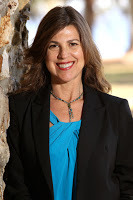 Susan U. Neal, RN, MBA, MHS: Susan’s mission is to improve the health of the body of Christ. She has her RN and MBA degrees, as well as a master’s in health science. She is a CERTIFIED HEALTH AND WELLNESS COACHwith the American Association of Christian Counselors. She published five books, the Selah award winner 7 STEPS TO GET OFF SUGAR AND CARBOHYDRATES, CHRISTIAN STUDY GUIDE FOR 7 STEPS TO GET OFF SUGAR AND CARBOHYDRATES, HEALTHY LIVING JOURNAL, SCRIPTURE YOGAa #1 Amazon best-selling yoga book, and YOGA FOR BEGINNERS which ranked #3. She published two sets of Christian Yoga Card Decks and two Christian Yoga DVDs that are available at CHRISTINAYOGA.COM. Her digital product HOW TO PREVENT, IMPROVE, AND REVERSE ALZHEIMER’S AND DEMENTIA is a great resource. To learn more about Susan visit her website SUSANUNEAL.COM You can also connect with Susan on FACEBOOK, TWITTER, and INSTAGRAM.
Susan U. Neal, RN, MBA, MHS: Susan’s mission is to improve the health of the body of Christ. She has her RN and MBA degrees, as well as a master’s in health science. She is a CERTIFIED HEALTH AND WELLNESS COACHwith the American Association of Christian Counselors. She published five books, the Selah award winner 7 STEPS TO GET OFF SUGAR AND CARBOHYDRATES, CHRISTIAN STUDY GUIDE FOR 7 STEPS TO GET OFF SUGAR AND CARBOHYDRATES, HEALTHY LIVING JOURNAL, SCRIPTURE YOGAa #1 Amazon best-selling yoga book, and YOGA FOR BEGINNERS which ranked #3. She published two sets of Christian Yoga Card Decks and two Christian Yoga DVDs that are available at CHRISTINAYOGA.COM. Her digital product HOW TO PREVENT, IMPROVE, AND REVERSE ALZHEIMER’S AND DEMENTIA is a great resource. To learn more about Susan visit her website SUSANUNEAL.COM You can also connect with Susan on FACEBOOK, TWITTER, and INSTAGRAM.
July 13, 2021
Publishing as a Second Language - One Sheets vs. Book Proposals

by Linda Gilden @LindaGilden
This year as I was preparing for Blue Ridge Mountains Christian Writers Conference One of the top questions I received from those I mentored was—“What’s the difference between a book proposal and a one sheet?” Most had heard of a book proposal but the concept of a one sheet was new and they were not sure where to even begin to create one.
The best place to start is in understanding the difference between the two. The one sheet and the book proposal serve very different purposes in the presentation of your material to an editor or publisher.
The Difference Between a One Sheet & a Book Proposal
1. The obvious difference between the two marketing pieces is the length. A one sheet is just that. One, usually 8 ½ x 11, piece of paper. You have the option of using the front and the back but many people are able to get plenty of information on one side of the paper. A book proposal, on the other hand, has much more detailed information, and can be upward of 50 pages depending on the length of the chapters.
2. The one sheet’s usage is several-fold. It’s a proposal in a nutshell. All the pertinent information is there – your contact info, bio, book specifications, stage of completion, and a brief summary. Because you are only using one side of one page, you can see how all that info must be brief and abbreviated. However, don’t be tempted to use a smaller font size just so you can get more words on the page. Make every word count and only use the ones that are specific to your needs.
The book proposal will fill in all the details. Because it is longer and will cover more of your marketing plans, deeper summaries, the table of contents, and more, you will rely on this piece to sell your book.
3. The main usage for your one sheet is to give the person you are meeting with an idea of what the book is like, your heart for writing it, and enough details to know if they have published anything similar recently or if it will fit in their editorial calendars. The one sheet can also give you an extra few seconds to calm your nerves and take one last deep breath before you make your presentation to the professional on the other side of the table. As you slide it across the table, you can say one last brief prayer that you will find favor with this editor or publisher. The one sheet will be the tool you use to pique the editor’s interest in your project and elicit the nod to send the entire book proposal. You can also use the one sheet to mail to event planners looking for speakers or put on your website as a download.
Don’t skimp on your materials, especially your one sheet. It could be your foot in the door to sending your next bestselling manuscript to the publisher! If you would like a sample one sheet, just let me know below. Include your email address please and I’ll be glad to send you one.
TWEETABLEPublishing as a Second Language - One Sheets vs. Book Proposals - @LindaGilden on @EdieMelson (Click to Tweet)
 Linda Gilden is an award-winning writer, speaker, editor, certified writing and speaking coach, and personality consultant. Her passion is helping others discover the joy of communicating with excellence. In the midst of all the busyness, Linda’s favorite activity is floating in a pool with a good book surrounded by splashing grandchildren—a great source of writing material! www.lindagilden.com
Linda Gilden is an award-winning writer, speaker, editor, certified writing and speaking coach, and personality consultant. Her passion is helping others discover the joy of communicating with excellence. In the midst of all the busyness, Linda’s favorite activity is floating in a pool with a good book surrounded by splashing grandchildren—a great source of writing material! www.lindagilden.com
July 12, 2021
The Basics of Plot for Writers
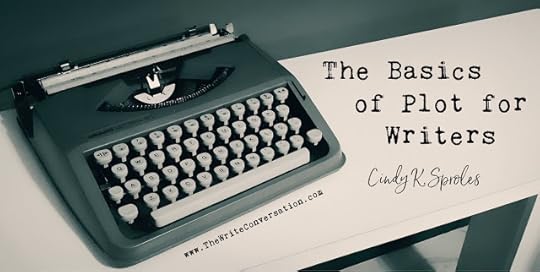
by Cindy K. Sproles @CindyDevoted
Some say I’m a pantser, writing by the seat of my pants and never knowing where the next turn in the story will be. I’ve never liked that title. None of us are truly pantsers. Few, if any, just sit down at the computer and begin to write without any thought of direction. I don’t outline every plot point but I do have a clear idea of where I want my story to go and how I want it to end. We all have to know where we want to go and what road to follow, otherwise, the possibility of becoming lost is great.
The basics of plotting don’t change and though the methods for arriving at each point may be different, the rules never change.
There must be an inciting incident that kicks the protagonist into movement. That one event that forces him/her to set out on a mission or adventure. When you think about it, this is how our lives are daily. For our adventure to begin, or for us to find a solution to a problem, something happens that forces us to draw a line in the sand and say, “I’ve had enough.” This is how we begin life and this is how we begin our novel.
Our plotting requires exposition—the introduction of our main character, the time and place where our story begins. Exposition helps us to show the ultimate conflict and theme of our story. Our story cannot move without this.
The action comes next. It starts with the inciting incident and continues to build throughout the story. It’s important to remember, action is not always a battle with guns or swords. Action is difficult situations, the angst, that our characters walk through and it’s this action and angst that drives our story forward. It’s what keeps the readers asking, “What on earth is going on?”
The more action and angst a writer can pour on their protagonist, the deeper the plot, the more the protagonist has to work to escape the hardship, and the more the reader becomes involved with your characters. Good action has the reader standing on the sideline cheering for the protagonist. They are plotting resolution in their minds and when a writer makes a 180ﹾ turn in the plot, readers love it. We all love the unexpected.
Story climax. This happens when tensions are so high the only thing left to do is break. Our protagonist is forced to come face to face with the antagonist and nothing can move until the resolution to their conflict is found. It has to end.
Our story now moves into the spot where the action eases and our characters have time to recover from an emotional scene. It’s important to remember that though angst makes a great story, our readers need to take a breath from time to time otherwise, the story becomes too intense and they lay the book down saying they just couldn’t take any more hardship. For every one or two hardships you dump on a character, allow them a minute to recover…both the character and the reader. Again, this is true in life. For every hardship we endure, there are moments when things smooth out. Our situation may not have ended but we’ve hit a place where we can take a breath – even if only for a moment.
Finally, every story has to have a resolution. I despised many of the movies in the late 70s and early 80s. Writers went through a time where they wrote amazing stories and just as we reach the end, there was never a resolution. The viewer was simply left hanging. I thought those movies had passed by until 2014 when the movie Lucy was released. This mind-bending science fiction story led us down a path to discover the purpose of life. According to the story, life’s purpose was to pass our knowledge and in this case, the actress called Lucy transforms into a supercomputer.
I’m sorry if I blew the ending for you but my point is, when the movie was over, the audience was left sitting there saying, “That’s it?” There was no resolution other than a girl becomes a computer. Grant you, it was a science fiction movie, but the fact remains readers, or in this case, the viewers, needed to feel satisfied. A resolution needs to be clear and effective. This is not to say you cannot lead them into an opening for a second story, but the story at hand, must have a resolution otherwise, your readers walk away disappointed and frustrated. It’s fine to show the reader the life of your character has not ended, there is more to see, but this particular incident—this time in their life, is complete. Without a resolution, the result can cause readers not to pick up a second book you write. It bends toward that “it only takes once putting your hand on a hot stove to figure out it burns,” and readers won’t allow you a second chance, no matter how great book two is.
Even as a pantser, I have preconceived plot points of where my story needs to go and how it needs to end. I am geared to write character-driven stories, so as I write, I allow my characters to make the natural turns in the plot that makes excellent subplots. I may not write out every plot point, (which by the way, makes writing a synopsis difficult), but I do know how I want my characters to get from point A, to point B, to point C. Without plot structure we have no story. James Scott Bell talks about the three scenes of a story – the beginning, the middle, and the end. Though we all chuckled in his class at this divine insight, his point was clear. We have to have a plot of some sort or there is no story.
Look through your work in progress and ask yourself if you have all the elements in your story. Add them if necessary. Write a well-rounded story that leaves your reader satisfied at the end.
TWEETABLEThe Basics of Plot for Writers - @CindyDevoted on @EdieMelson (Click to Tweet)
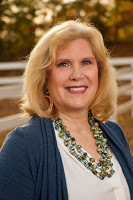 Cindy K. Sproles is an author, speaker, and conference teacher. She is the cofounder of Christian Devotions Ministries and the executive editor for christiandevotions.us and inspireafire.com. Cindy is the lead managing editor for SonRise Devotionals and also Straight Street Books, both imprints of LPC/Iron Stream Media Publications. She is a mentor with Write Right and the director of the Asheville Christian Writers Conference held each February at the Billy Graham Training Center, the Cove, Asheville, NC. Cindy is a best selling, award winning novelist. Visit Cindy at www.cindysproles.com.
Cindy K. Sproles is an author, speaker, and conference teacher. She is the cofounder of Christian Devotions Ministries and the executive editor for christiandevotions.us and inspireafire.com. Cindy is the lead managing editor for SonRise Devotionals and also Straight Street Books, both imprints of LPC/Iron Stream Media Publications. She is a mentor with Write Right and the director of the Asheville Christian Writers Conference held each February at the Billy Graham Training Center, the Cove, Asheville, NC. Cindy is a best selling, award winning novelist. Visit Cindy at www.cindysproles.com.
July 11, 2021
How Writers Can Get Speaking Engagements

by Yvonne Ortega @YvonneOrtega1
Texts, phone calls, and emails fill my “in box” with the same concern: “I’m an author. How can I get speaking engagements?” I will start with one step that many believers include as their last, rather than their initial one.
First, pray for speaking engagements.
As you pray, ask God for favor. Tell God what topics you’re passionate about and eager to share. God knows what they are. And yet, your loving heavenly Father longs to hear from you.
I’ve spoken dozens of times in English and Spanish on the Christian woman in a domestic violence relationship or divorced because of abuse.
Early in the pandemic, planners canceled events and book signings. However, state and federal government officials have eased restrictions.
I ask God for favor where He wants me to speak.
You can ask God where He wants you to speak. The Bible says, “But as for me, I will watch expectantly for the Lord; I will wait for the God of my salvation. My God will hear me” (Micah 7:7 NASB1995).
Recently, I thought God would grant me favor in two places overseas. I waited in prayer. Those events were not God’s will for me at least not at the present. I submitted to God and said, “I will watch expectantly for the Lord . . . My God will hear me.”
Second, prepare for those speaking engagements.
In faith I prepare for those speaking engagements. Years ago, I prepared a breakout session on writing to heal versus writing about trauma. I updated and expanded the session every time I spoke on that topic at a retreat, a seminar or a conference throughout the United States. I also tweaked it for the specific audience and updated the handouts.
Once again, I revised the handouts to go with my new theme and will update the slide deck.
I practice at home. My writers group and my AWSA (Advanced Writers and Speakers Association) mastermind members serve as my “trial audience.” I thank God for them and welcome their feedback.
By the way, I’ll practice for an early-bird clinic or two early-bird clinics back-to-back at a conference. Why not? “My God will hear me.”
Third, praise God for all He has done for you.
Years ago, a wonderful Bible teacher in my neighborhood said, “Yvonne, memorize Psalm 34. Afterward, praise God for all His wonderful deeds in your life.”
As I did that, my faith grew stronger. So did my desire to worship God because of His faithfulness to me.
In my desire for God’s perfect speaking engagements, I praised God with a grateful heart for all the ones He gave me in the past. I also looked at pictures of those opportunities to share what God did for me and every woman present.
Pray, prepare, and praise God for your past speaking events and those He will provide. Let me know when He answers you. I look forward to hearing from you.
TWEETABLEHow Writers Can Get Speaking Engagements - @YvonneOrtega1 on @EdieMelson (Click to Tweet)
 Yvonne Ortega walks with a small footprint but leaves a giant imprint in people’s lives. This power-packed package is a professional speaker and the author of the Moving from Broken to Beautiful® Series through cancer, divorce, forgiveness, and loss. Learn more at WWW.YVONNEORTEGA.COM
Yvonne Ortega walks with a small footprint but leaves a giant imprint in people’s lives. This power-packed package is a professional speaker and the author of the Moving from Broken to Beautiful® Series through cancer, divorce, forgiveness, and loss. Learn more at WWW.YVONNEORTEGA.COMYvonne speaks with honesty and humor as she shares her life and struggles through presentations that empower women to find peace, power, and purpose through God’s Word.
Yvonne’s background as a licensed professional counselor brings a unique perspective into the heart of women. She’s a speaking and writing coach and the owner of Moving from Broken to Beautiful®, LLC. She belongs to the Advanced Writers and Speakers Association, the Christian Authors Network, the National Speakers Association, and Toastmasters International.
She celebrates life at the beach, where she walks, builds sand castles, blows bubbles, and dances.
July 10, 2021
Misunderstandings & Faith That God Will Guide Us Through

by Martin Wiles @LinesFromGod
What she got wasn’t what she wanted.
My wife and a couple of her lady friends love to visit a local restaurant for breakfast once or twice a week. I don’t care for the establishment. In fact, my bad experiences became so numerous that the only way I could ever visit was to do so with “no expectations.” After all, if I don’t expect anything, I can’t be disappointed. Going with this attitude also prevented me from getting a bad attitude when things didn’t go my way—which happened on every visit.
But back to the story. As I prepared for a day of teaching, my wife sent a picture of what her friend had received when she ordered a grilled sausage and cheese sandwich. I marveled at the photo, but wasn’t surprised. The cook had cut the sandwich in half. One half held sausage and cheese on toasted bread. The other half was a plain grilled cheese sandwich.
As an English teacher, I understood how this could have happened. But had I been the customer, I’m sure I wouldn’t have. Had the server wrote a grilled sausage and a cheese sandwich on the ticket, the article “a” could have confused the cook, making him think the customer wanted two different sandwiches. But if the waitress didn’t include the article, the cook should have known the customer wanted only one sandwich.
Having seen, and written, tickets for cooks before, I know a little of the lingo—lingo the cook should have known. Regardless, the cook misunderstood, and my wife’s friend wasn’t happy. And she surely wasn’t ecstatic when later a roach ran across their table, leading the manager to give them a free meal.
Paul knew a little about being misunderstood. “You may be asking why I changed my plan. Do you think I make my plans carelessly? Do you think I am like people of the world who say ‘Yes’ when they really mean ‘No’” (2 Corinthians 1:17 NLT)?
In this case, Paul’s Plan A had entailed leaving Ephesus, crossing the Aegean Sea, and going directly to Corinth where he planned to help the Corinthians work out some church problems. Before returning to Corinth, he planned to visit a few other churches.
But Plan A didn’t materialize, so Paul resorted to Plan B, which entailed only one visit to Corinth. As difficult as travel and communication were in this time, it seems childish that the Corinthians would misunderstand his intentions and accuse him of being fickle and unreliable—but some di d. Of course, our intentions are at stake—and they should be honorable. But no matter how hard we try, others will misunderstand us sometimes. It’s one of those inevitable things in life we must deal with. And when we’re misunderstood, some won’t care to hear our explanation as we attempt to straighten out the misunderstanding. Paul pled with those who misunderstood him to hear his heart, but I’m sure some didn’t care to hear his explanation.
The good news is, some will hear and forgive. Some will see our heart and offer their understanding and forgiveness. Relationships will heal.
Regardless of whether the misunderstanding is smoothed over or not, our part entails keeping our word in the first place. Being honest. Especially when it comes to spiritual matters. And when the inevitable misunderstanding happens—and our efforts aren’t good enough to straighten things out—we must put the matter in God’s hands. Even Jesus was misunderstood…many times.
Expect life to hold misunderstandings but have faith that God will guide you through them.
TWEETABLEMisunderstandings & Faith That God Will Guide You Through - Martin Wiles, @LinesFromGod on @EdieMelson (Click to Tweet)
 Martin Wiles is the founder of Love Lines from God (www.lovelinesfromgod.com) and serves as Managing Editor for Christian Devotions, Senior Editor for Inspire a Fire, and Proof Editor for Courier Publishing. He has authored six books and has been published in numerous publications. His most recent book, A Whisper in the Woods: Quiet Escapes in a Busy World, released in December 2019. He is a freelance editor, English teacher, author, and pastor.
Martin Wiles is the founder of Love Lines from God (www.lovelinesfromgod.com) and serves as Managing Editor for Christian Devotions, Senior Editor for Inspire a Fire, and Proof Editor for Courier Publishing. He has authored six books and has been published in numerous publications. His most recent book, A Whisper in the Woods: Quiet Escapes in a Busy World, released in December 2019. He is a freelance editor, English teacher, author, and pastor.
July 9, 2021
Writers, Let's Remove the Words “I Quit” From Our Vocabulary

by Beth K. Vogt @BethVogt
Anyone else have a rough writing week? Show of hands, please. Anyone?
Monday and Tuesday were frustrating days for me. Doubt got me in a headlock and tried to take me down and pin me to the mat. Thanks to an honest conversation with a trusted writer-friend—and a healthy dose of prayer—doubt didn’t win.
By Tuesday afternoon, I got up off the mat as the victor. Worn out, yes, but I won the wrestling match. I also came away with a pivotal realization. There are two words that should be removed from every writer’s vocabulary:
I quit.
The thought sneaks up on us under the guise of “Maybe I should quit …” Those four words are a kinder, gentler version of the final takedown, “I quit.” But even beginning to entertain the maybe? We’re letting our guard down, giving doubt the upper hand in the mental battle.
When we get discouraged in our writing journey, it’s easy not to guard our thoughts:Maybe you didn’t final in an award. Maybe you finaled, but you didn’t win. Thought: I’m not good enough. Maybe your rough draft needs more work than you realized. Thought: I should just give up on this story.Maybe your proposal got all the way to the pub board—and stalled out. Again. Thought: Why do I keep trying? I’m never going to get published. All those doubts can lead to “Maybe I should just quit …” and then become “I quit.”
Quitting is an attitude born out of doubt and defeat. We’re not thinking clearly when we’re in that kind of mental wrestling match.
Forget about quitting. Instead ask, “What’s next?”
Those two words, that question, “What’s next?” gives us breathing space. It opens the door for opportunity. For God to work. For you to stay the course … or to move forward to the next right, good thing waiting for you.
Consider this: Write the words “I quit” on a piece of paper. Then cross them out. Now write the words “What’s next?” on the paper. Post the paper on your computer or somewhere you can see it when you’re writing.
TWEETABLEWriters, Let's Remove the Words “I Quit” From Our Vocabulary - @BethVogt on @EdieMelson (Click to Tweet)
 Beth K. Vogt believes God’s best often waits behind the doors marked “Never.” Having authored nine contemporary romance novels and novellas, The Best We’ve Been, the final book in Beth’s Thatcher Sisters Series with Tyndale House Publishers, releasers May 2020. Other books in the women’s fiction series include Things I Never Told You, which won the 2019 AWSA Award for Contemporary Novel of the Year, and Moments We Forget. Beth is a 2016 Christy Award winner, a 2016 ACFW Carol Award winner, and a 2015 RITA® finalist. An established magazine writer and former editor of the leadership magazine for MOPS International, Beth blogs for Learn How to Write a Novel and The Write Conversation and also enjoys speaking to writers group and mentoring other writers. Visit Beth at bethvogt.com.
Beth K. Vogt believes God’s best often waits behind the doors marked “Never.” Having authored nine contemporary romance novels and novellas, The Best We’ve Been, the final book in Beth’s Thatcher Sisters Series with Tyndale House Publishers, releasers May 2020. Other books in the women’s fiction series include Things I Never Told You, which won the 2019 AWSA Award for Contemporary Novel of the Year, and Moments We Forget. Beth is a 2016 Christy Award winner, a 2016 ACFW Carol Award winner, and a 2015 RITA® finalist. An established magazine writer and former editor of the leadership magazine for MOPS International, Beth blogs for Learn How to Write a Novel and The Write Conversation and also enjoys speaking to writers group and mentoring other writers. Visit Beth at bethvogt.com.
July 8, 2021
When a Writer is Stressed, A List of What NOT to Do

by Edie Melson @EdieMelson
I don’t know about you, but life is a little stressful and my To Do list is full to overflowing. I sat down the other morning to take an honest look at all the things on my plate and I discovered that just like piling on too much at a summer potluck, I was overloaded.
It’s funny, but the worst offenders turned out to be the things I really shouldn’t have added in the first place. So today I’m sharing what I discovered. And by the way, discovering these was painful for me too!
A NOT To Do List for Writers
1. Stop worrying about results. I’m a control freak and spend the most mental effort trying to affect outcomes instead of pouring energy into the work itself. I will be obedient with what God has given me (time, ideas, resources, etc.) and I will leave the results up to Him
The heart of man plans his way, but the LORD establishes his steps. (Proverbs 16:9 ESV)
2. Quit comparing. So what if Susi Author has 25,000 Instagram followers or Jason Writer finaled in the most recent contest? God has a plan for MY writing that doesn’t look like anyone else’s. I need to focus on that, not what is happening to everyone.
For where envy and selfish ambition exist, there is disorder and every kind of evil. ( James 3:16 HCSB)
3. Stop shortchanging time with God. I’ve learned that when I’m over loaded the LAST thing I need to do is skimp on reading the Bible, praying and spending time with God.
But seek first the kingdom of God and his righteousness, and all these things will be added to you. (Matthew 6:33 ESV)
4. Don’t work even harder. But stressed makes me want to work longer hours to get caught up. That’s a trap. Instead, when life caves in, rest and joyful activities are even more important. We can’t get water from a dry well.
And he said to them, “Come away by yourselves to a desolate place and rest a while.” For many were coming and going, and they had no leisure even to eat. (Mark 6:31 ESV)
5. Stop relying on your own strength. This goes hand in hand with #4 above. All my inspiration, talent and knowledge comes from God. It’s HIS strength that gets me through the hard times.
Do not fear, for I am with you; Do not be afraid, for I am your God. I will strengthen you, I will also help you, I will also uphold you with My righteous right hand. ’ (Isaiah 41:10 NASB)
6. Don’t give head-space to doubt and fear. I have learned that when I’m stressed, Satan comes after me swinging hard. And one of the first traps he sets is with doubt and fear. When life is difficult is NOT the time to rethink your calling or stop because you’re afraid. Instead it’s time to remember God’s call and move forward in faith.
For the gifts and the call of God are irrevocable. ( Romans 11:29 NET)
7. Stop working in chaos. When I get overwhelmed, I get mentally messy and scattered. I’ve found that’s when I need to stop, make a list and prioritize. I look at my schedule and figure out what I actually time I actually have and how I can use it most effeciently.
For God is not a God of disorder but of peace —as in all the congregation s of the Lord ’s people . (1 Corinthians 14:33 NIV)
8. Don’t anticipate trouble. When I’m stressed, I often slip into a negative mindset and find myself assuming the next email/phone call/message will be more problems. When I quit looking for trouble, it’s easier to dig my way out of an overloaded season.
So then, do not worry about tomorrow, for tomorrow will worry about itself. Today has enough trouble of its own . (Matthew 6:34 ESV)
9. Quit assuming it’s always going to be this way. When I’m in a hard season, I tend to feel like things are never going to get better. I need to remember life hasn’t always been this way and there will come a time when it will get easier.
Because of the Lord’s faithful love we do not peris h, for His mercies never end . They are new every morning; great is Your faithfulness (Lamentations 3:22-23 HCSB)
The life of a writer has seasons—some are easy and some are more difficult. The one constant in our lives is God. Where ever we are, He is with us. The most important thing to remember is not to get caught up looking at the problems and instead look up. Whatever we’re facing, He’s already got a plan.
This is my NOT To Do List, what would you add to it?
Don’t forget to join the conversation!
Blessings,
Edie
TWEETABLE
When a Writer is Stressed, A List of What NOT to Do - @EdieMelson (Click to Tweet)
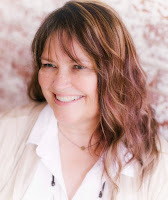 Edie Melson is a woman of faith with ink-stained fingers observing life through the lens of her camera. No matter whether she’s talking to writers, entrepreneurs, or readers, her first advice is always “Find your voice, live your story.” As an author, blogger, and speaker she’s encouraged and challenged audiences across the country and around the world. Her numerous books reflect her passion to help others develop the strength of their God-given gifts and apply them to their lives. Connect with her on her website, through Facebook, Twitter and on Instagram.
Edie Melson is a woman of faith with ink-stained fingers observing life through the lens of her camera. No matter whether she’s talking to writers, entrepreneurs, or readers, her first advice is always “Find your voice, live your story.” As an author, blogger, and speaker she’s encouraged and challenged audiences across the country and around the world. Her numerous books reflect her passion to help others develop the strength of their God-given gifts and apply them to their lives. Connect with her on her website, through Facebook, Twitter and on Instagram.



